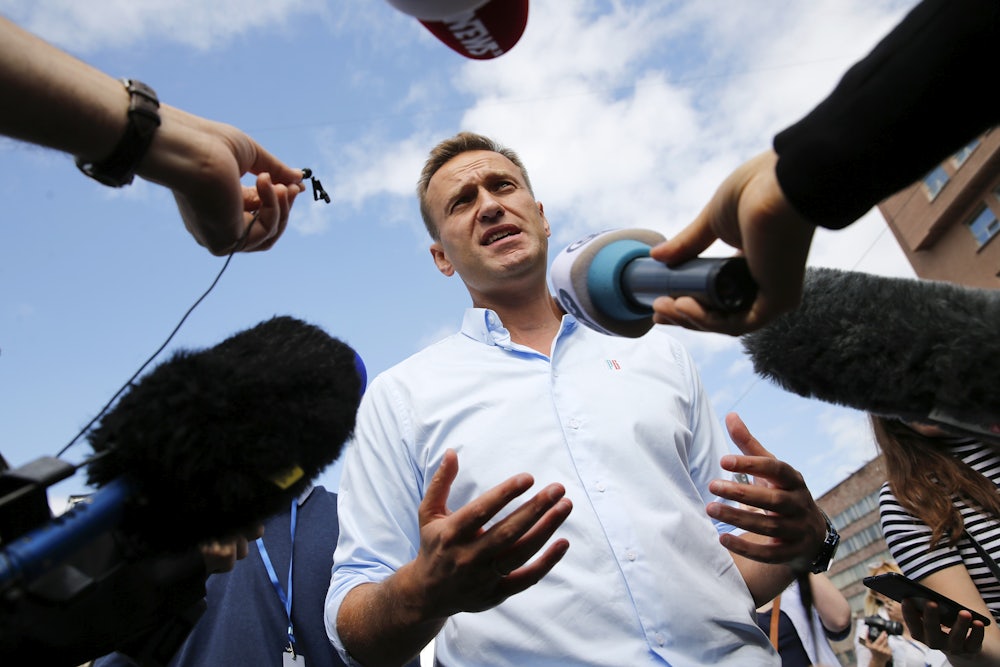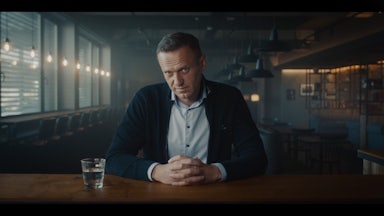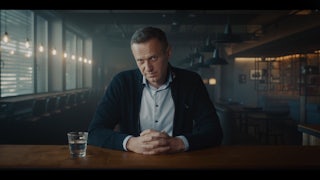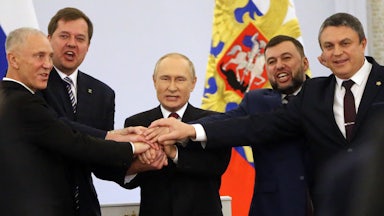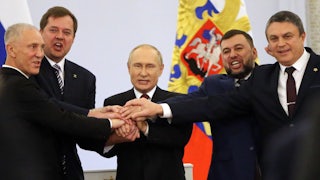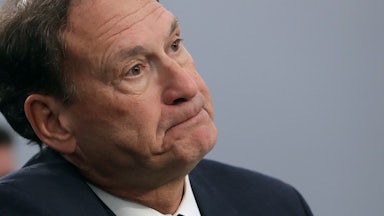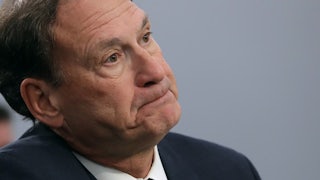Last week, jailed Russian opposition leader Alexei Navalny penned a 2,200-word essay in The Washington Post on what post-Putin Russia should potentially look like. The essay centers on the need to transform Russia into a “parliamentary republic” and the means by which a “radical reduction of power in the hands of one person” can be brought about in a nation that has been ruled by a corrupt strongman for so long. More broadly, the piece condemns the Kremlin’s “imperial authoritarianism,” which “is the real curse of Russia and the cause of all its troubles.”
The essay is a remarkable testament to not only Navalny’s vision but his ceaseless bravery. The Russian opposition leader penned the piece from Russian prison, where he is serving a years-long sentence on falsified charges—and did so after the Kremlin attempted to poison him out of existence.
Still, there’s one conspicuous, glaring absence from Navalny’s blueprint of “what a post-Putin Russia should look like.” It has less to do with the kind of governance system Russia needs and more to do with what a post-Putin Russia should, quite literally, look like. What will become of the Ukrainian lands Putin has claimed should rightfully belong to Russia—and, specifically, what should happen to Crimea?
For years, Navalny has danced around the issue of Crimea, preferring to focus less on Moscow’s 2014 seizure of the Ukrainian peninsula and more on Putin’s rank kleptocracy. The opposition figure’s few comments on the Ukrainian region came in the swirl surrounding Russia’s initial 2014 invasion, when Putin first launched his revanchist project in Ukraine. In a LiveJournal post, Navalny wrote that the fact that Ukraine controlled Crimea—an area transferred by Soviet authorities to the Ukrainian SSR in 1954—was “wrong, unfair and insulting to any normal resident of the Russian Federation.” Asked if it was “right that Crimea belongs to Ukraine,” Navalny responded, “Of course not.” (In 1991, Crimea, just like every other Ukrainian province, voted for Ukrainian independence, a fact that seems to be lost on every Russian nationalist.)
Even after Putin’s claimed annexation, Navalny said he didn’t see any Ukrainian future for the region. “I advise the Ukrainians not to kid themselves, either,” Navalny said. “It will remain part of Russia and will never become part of Ukraine in the foreseeable future.” When asked directly whether, as president, Navalny would return Crimea to Ukraine, he responded, “What, is Crimea a ham sandwich or something that you can take and give back? No, I don’t believe so.”
Navalny, to his credit, has repeatedly condemned the method with which Putin seized this swath of southern Ukraine. As Navalny rightly said, Putin grabbed Crimea “with egregious violations of all international regulations.” And those responsible for this brutalizing of international norms should be held to account, he says, calling for specific sanctions against Russian officials following the annexation. Even in that LiveJournal post mentioned above, Navalny proclaimed that “changing the borders of states in Europe using troops and force in unacceptable.”
These are all welcome messages. But they don’t change one increasingly inescapable fact: Navalny has never called, unequivocally and without reservation, for Crimea to be returned to Ukraine. Navalny “is generally sympathetic to the idea of seeing the peninsula as a part of Russia,” as scholar Jussi Lassila wrote in 2016. Or as Andreas Umland wrote last year, the opposition leader maintains an “unclear position” on Crimea. Rather than returning Crimea to Ukraine outright, Navalny has instead called for a second, “normal” referendum. But it’s unclear why anyone, in Ukraine or elsewhere, would sign off on such a thing. (Try to imagine, say, an anti-Nazi opposition figure calling for a “normal” referendum in the Sudetenland, and you can see the ridiculousness of such a venture.) This is all the truer now that Crimea is no longer anything special but is instead just one of a broader bundle of provinces Putin has claimed as Russian.
That lack of clarity has already begun generating criticism in former Russian colonies, not least Ukraine. As Umland continued, Navalny’s “often ambiguous statements regarding Ukrainian sovereignty have generated considerable pessimism among Ukrainian audiences over his possible future role in Russian politics.” (This likely isn’t helped by the fact that, in the same interview Navalny claimed Crimea wasn’t a “ham sandwich,” he also said he didn’t “see any difference whatsoever between Russians and Ukrainians.”) After all, as Ukrainian writer Volodymyr Vynnychenko once said, “the Russian liberal ends where Ukraine begins.” And Ukrainians—and other populations devastated by Russian colonialism—remain unclear on where Navalny believes Ukraine begins.
Again: None of this detracts from Navalny’s stupendous bravery and incomparable work highlighting Putin’s corruption, even while wasting in an effective Russian gulag. But we’ve seen this story before. In 1991, another Russian liberal leader, caught between a crumbling regime and a potential right-wing coup, displayed prodigious bravery, scrambling atop a tank to face down the might of the Soviet military. For years afterward, Boris Yeltsin was the darling of the Washington establishment—which then proceeded to look the other way while Yeltsin slaughtered Chechens en masse, meddled in multiple former Russian colonies, called for revising Ukraine’s borders, and created the super-presidential system that’s still with us. All of this, even before ushering Putin into the Kremlin.
Or look at the man who, quite literally, wrote the book on the Soviet gulag. Author Alexander Solzhenitsyn was feted for his magisterial work on the Soviet labor camp system; he not only won a Nobel Prize for his writing, but his Gulag Archipelago remains one of the most important works written during the Soviet era.
And yet, amid the Soviet crumble, Solzhenitsyn revealed a different side, not only calling for Moscow to partition countries like Kazakhstan but pushing to keep Ukraine firmly in Russia’s embrace. There was no reason, Solzhenitsyn wrote, for Russia to “hack off … those parts that weren’t part of old Ukraine”—specifically singling out areas like Crimea and the Donbass, which Putin has now proclaimed as rightfully Russia’s. If Putin is overseeing an irredentist project Europe hasn’t seen since the Second World War, he’s simply following Solzhenitsyn’s playbook—a playbook developed by a man once invited into the highest echelons of Western power and once identified as a “symbol of internal opposition” to the Kremlin.
If there’s one lesson from the post–Cold War era, it’s that the West can’t keep placing all of its hopes in a single Russian figure, in a single supposed liberal who can carry Moscow toward a more peaceable, more democratic future. It was true with Yeltsin, when, for instance, the United States did nothing while the Russian leader bludgeoned Chechnya. (U.S. inaction was predicated “on the assumption that everything must be done to support President Yeltsin as the only hope for Russian democracy.”) It was true when Putin ascended to the Kremlin, with the West shrugging off his early comments that Ukraine was “not even a country.” It was true even under the presidency of Dmitry Medvedev—a man who has, in recent months, called for outright genocide in Ukraine.
And it is a lesson the West—which now includes Ukraine—must carry forward, if ever a peaceful, European Russia is to emerge. No longer can the West simply sweep nationalistic sentiments under the rug or wish such nods toward revanchism away. Even in preferred partners—and Navalny, it should go without saying, is infinitely preferable to Putin—the West must demand more, and better.
The good news is that we’re already seeing signs of such pressure work. While Navalny has still refrained from saying Crimea is unequivocally Ukrainian, his chief of staff, Leonid Volkov, recently proclaimed that Crimea is undoubtably Ukrainian. And this all might soon be moot anyway, as Ukraine barrels toward retaking Crimea outright.
But others have noticed Navalny’s reticence. “I have been wondering if the depressingly consistent downplaying of [Russian] imperialism among many of Putin’s prominent critics is a deliberate political strategy or a genuine blind spot,” Pitzer College professor Azamat Junisbai recently tweeted, citing Navalny’s op-ed. “Both possibilities are dreadful and do not bode well for post-Putin.”
He’s precisely right. The most charitable reading of Navalny’s reticence is that it’s a domestic political play, to gather support among neo-imperial Russians for his political future. But even if Navalny is simply nodding to the nationalist contingent he’ll need to help uproot Putin, that’s not good enough. He and every other partner the West should wish to see in Moscow must be better. The West, and former Russian colonies, have been burned far too many times, and we can’t make those mistakes again. Otherwise, we’ll not only find ourselves disappointed once more—but we’ll be dealing with another administration in the Kremlin that might one day usher in yet another Putin, starting this entire horrendous cycle all over again.
